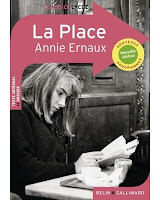ALICE DIOP: the literature of Annie Ernaux as a transformative feature of her experience as a woman | la littérature d’Annie Ernaux comme un effet transformatif sur son expérience en tant que femme.
Grand prix du jury et le prix du premier film de fiction «Saint-Omer» à la Mostra de Venise, la cinéaste Alice Diop évoque le rapport fondamental qu’elle entretient depuis des années avec l’œuvre de l’autrice nobélisée ce jeudi.
Laureate of the Grand Jury Prize and the prize for the first fiction film "Saint-Omer" at the Venice Film Festival, cineaste Alice Diop talks about the pivotal bond she has had for years with the work of the newly minted Nobel Prize laureate Annie Ernaux.
Source: liberation.fr
 «C’est bien la première fois que je suis émue aux larmes pour l’annonce d’un prix Nobel ! J’ai lu la Place
quand j’avais 20 ans, j’étais à la Sorbonne en histoire, je me sentais
profondément seule, déphasée et d’un coup, ce livre m’a offert un miroir
réflexif comme si l’auteure concentrait dans ses pages en m’ayant
devancée dans son parcours, sa réflexion, un ensemble d’expérience très
spécifique propre à ce qu’on a fini par nommer les transfuges de classe.
«C’est bien la première fois que je suis émue aux larmes pour l’annonce d’un prix Nobel ! J’ai lu la Place
quand j’avais 20 ans, j’étais à la Sorbonne en histoire, je me sentais
profondément seule, déphasée et d’un coup, ce livre m’a offert un miroir
réflexif comme si l’auteure concentrait dans ses pages en m’ayant
devancée dans son parcours, sa réflexion, un ensemble d’expérience très
spécifique propre à ce qu’on a fini par nommer les transfuges de classe.
«Partir d’une situation de fragilité, surmonter la honte, raconter la violence subie, élever au rang de littérature des choses qui n’étaient pas destinées à entrer dans son champ comme ces pages géniales sur l’odeur d’eau de javel à la maison, tant sa mère est obsédée par le ménage, odeur que j’ai sentie, presque portée sur moi toute mon enfance, c’était bouleversant.
Mon expérience de femme a été traversée par sa littérature, c’est puissant, politique, chirurgical. Elle a éclairé, nommé, ce que j’avais vécu, elle l’a réparé et a transformé ma fragilité en puissance, elle m’a permis de devenir la femme que je suis.
Translation from French by Beti Ellerson
“This indeed is the first time that I was moved to tears by the announcement of a Nobel Prize! I read La Place when I was 20 years old, I was at the Sorbonne studying history, I felt deeply alone, out of step and suddenly, this book offered me a reflective mirror of what had preceded me, as if in its pages the author was bringing to bear in her journey, her thinking, a very distinct body of experiences specific to what we have come to call class defectors.
"Starting from a situation of fragility, overcoming shame, recounting the violence suffered, elevating to the rank of literature things that were not intended to enter into its field, like these brilliant pages about the smell of bleach in the house, from her mother’s obsessive cleaning—an odor that I smelled. It almost carried me back to my entire childhood, it was overwhelming.
My experience as a woman was marked by her literature, it is powerful, political, surgical. It clarified, named, what I had experienced, it rebuilt and transformed my fragility into power, it allowed me to become the woman that I am."



No comments:
Post a Comment
Relevant comments are welcome - Les discussions constructives sont les bienvenues